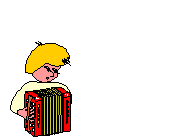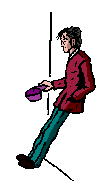

The Village Has a Music Festival
The 2021 Christmas mantel. For closeups, click on the Church, the Gazebo, and each of the ten
houses.

For a widescreen version of this mantel village, click here.

 A year ago, Mayor Albert Pittman had an epiphany (granted, one of many he's had over the years): the village has never hosted a proper music festival. The idea had first occurred to him when he heard the angelic sounds of the boys' choir practicing in front of the hospital. Music! What is Christmas without it? And what better way to attract visitors to the downtown area, where they might likely dine and shop and stay overnight at the newly opened Grand Hotel? The idea would be to scatter musicians throughout the area rather than have one big central concert. Possibly he could once again engage the Austrian marching band to play something cheery and rousing. Not marching songs, exactly, but something to get folks in the mood to spend. Yes, an excellent plan, and one that his wife Lavinia would surely be willing to support. Financially, that is, because the village's coffers were just a bit low this fiscal quarter.
A year ago, Mayor Albert Pittman had an epiphany (granted, one of many he's had over the years): the village has never hosted a proper music festival. The idea had first occurred to him when he heard the angelic sounds of the boys' choir practicing in front of the hospital. Music! What is Christmas without it? And what better way to attract visitors to the downtown area, where they might likely dine and shop and stay overnight at the newly opened Grand Hotel? The idea would be to scatter musicians throughout the area rather than have one big central concert. Possibly he could once again engage the Austrian marching band to play something cheery and rousing. Not marching songs, exactly, but something to get folks in the mood to spend. Yes, an excellent plan, and one that his wife Lavinia would surely be willing to support. Financially, that is, because the village's coffers were just a bit low this fiscal quarter.
Business is brisk at the veterinarian's clinic (House 1):
Passing the vet at that very moment is a coach filled with the mayor hopes big spenders. They have heard about the Music Fest and, being music lovers, have chartered the coach for the day. (But alas, they will not be staying the night.)
 It was bound to happen. Every year, someone's dog ate something bad around the holidays. This time it was Boots's litter mate Rags, who had nibbled on some holly berries. Fortunately, holly berries don't taste very good, so Rags was spared the worst possible fate. Still, it was best to have him checked out. Rags being Rags, he never did like strangers, especially strangers with thermometers. He hangs back from his owners as they crank the bell on Dr. Connor Allen's front door. If a dog could talk, this dog would be saying "I'm much better now, thank you. Let's go home."
It was bound to happen. Every year, someone's dog ate something bad around the holidays. This time it was Boots's litter mate Rags, who had nibbled on some holly berries. Fortunately, holly berries don't taste very good, so Rags was spared the worst possible fate. Still, it was best to have him checked out. Rags being Rags, he never did like strangers, especially strangers with thermometers. He hangs back from his owners as they crank the bell on Dr. Connor Allen's front door. If a dog could talk, this dog would be saying "I'm much better now, thank you. Let's go home."
Will gets to show off his French horn skills again (House 2):
"And very well, too," the mayor had added. "He's a natural. The man is good at whatever he does."
"Well! I certainly did not care for his layout for the gardens at The Grand," Lavinia had argued. "Too much jasmine and that awful wisteria. As you know, I am allergic." Her husband had nodded in weary agreement. "Of course you are."
Listening to the musicians, Will's wife Harmony is entranced. Will has become so good at playing his horn that he need not practice in the barn anymore. He is now allowed to play in the house, something he teases her about whenever they are with friends.
Also enjoying the horns are Dr. Allen's wife and four children. (Their dog, however, could go either way. To him some of the music seemed on the noisy side). They all have stepped out from the clinic's living quarters to enjoy the show and have not noticed that the vet has a patient waiting not so patiently at his door. "Oh!" cries Mrs. Allen upon seeing them. "Back to the house now," she urges her children, shepherding them inside. "You can join up in a little while with Miss Harmony's girls to see the other musicians."
 The mayor could not decide which musicians to set up where, so his wife Lavinia made the call. "The horns should come first. How else will people know where to start? A trumpet announces things. A trumpet says, 'Begin here.' And besides, Will's house is first on the tour, and Will plays a horn."
The mayor could not decide which musicians to set up where, so his wife Lavinia made the call. "The horns should come first. How else will people know where to start? A trumpet announces things. A trumpet says, 'Begin here.' And besides, Will's house is first on the tour, and Will plays a horn."
Mrs. Pettifore prefers the strings section (House 3):
Irritating. The musicians have ended their soothing, pleasant piece and have launched into a kind of a jig. It makes Eloise want to dance, but her mother has her firmly by the hand. "No public displays, child. It is not becoming."
This was new. Rebellion of this order? No, this was new. Of course, the child could not remain a little girl forever; her mother knew that. But ... at least for a little while longer? "They will surely play other music that you like," Mrs. Pettifore says with a touch of sadness. "We'll come back later to listen." (But only, she is resolved, to listen. No dancing.)
Nearby, Mrs. Jack Jones (whom everyone still calls Miss Bates) and her husband are making their way from one musicians' group to the next. Jack Jones loves music, and so does his wife, but, really, they are both getting on and the walk through the village seems much more taxing lately. Miss Bates has finally consented to use a cane! But it's a recent decision, and she has forgotten it at home. Their one-eyed dog Boots is confused. His mistress had been walking more briskly lately with that long stick (which she never throws for him to fetch, sorry to say). But today she has slowed way down again. He tries to pace himself to match her walk. It's the least he can do. She is, after all, a very kind mistress.
Max Schurster is hardly aware of the string musicians playing their lively tune. He is much more focused on the tall, thin man who is trying to move brusquely past him. "Now see here, Yasso," he says, putting out his hand to stop him. I don't know what game you're playing, but it won't fly. That loan is due in one week, and asking my wife to plead for an extension is not acceptable. To confront her at the market this morning it won't do, Yasso. You put her in a bad position. Very bad."
Junior Yasso mumbled, "Sorry, sir. You know how it be. I've naught funds to pay it back, and that's the God's truth."
"In that case, you come to the bank and you speak to me, not my wife. My wife does not work for the bank. You show up Monday morning promptly, or else."
 "Now isn't this nice, Eloise?" Mrs. Pettifore remarks to her daughter. "So genteel. There's nothing like a violin to lift one's soul. So moving, so inspiring, so "
"Now isn't this nice, Eloise?" Mrs. Pettifore remarks to her daughter. "So genteel. There's nothing like a violin to lift one's soul. So moving, so inspiring, so "
 "Well, I don't care if it is or not. That music makes me happy, not like what they just played. Mama, let go of my hand. I really want to dance!" She tries to wrest herself free.
"Well, I don't care if it is or not. That music makes me happy, not like what they just played. Mama, let go of my hand. I really want to dance!" She tries to wrest herself free.
 "Yessir." He scurried off and the banker sighed. Junior Yasso did not have two coins to rub together, everyone knew that. The loan was modest, given mostly because his mother had been ill and there were medical bills to pay. Unfortunately, Junior hadn't paid them but had gambled the money, trying to parlay it into big winnings. His mother had recovered, but Max was sure that the loan would not be. Ah well, he told himself. It's Christmas. I will give him a stern warning and let this one go. He snorted. I am getting soft in my old age.
"Yessir." He scurried off and the banker sighed. Junior Yasso did not have two coins to rub together, everyone knew that. The loan was modest, given mostly because his mother had been ill and there were medical bills to pay. Unfortunately, Junior hadn't paid them but had gambled the money, trying to parlay it into big winnings. His mother had recovered, but Max was sure that the loan would not be. Ah well, he told himself. It's Christmas. I will give him a stern warning and let this one go. He snorted. I am getting soft in my old age.
The Marching Band may be marching off (House 4):
The current bandleader was ready to take his trombone and just march away from all of them. They're like schoolchildren, with that endless squabbling. After their old bandleader accepted an offer to play at the Philharmonic, Jakob stepped in, sure that he could rule this unruly bunch. But so far he was having only middling luck. At this rate, there would be no clash of cymbals or thumps of the drum. There would be just a broken contract. He gritted his teeth, brought his anger under control, and stopped in his tracks. We are here to perform. We will perform.
And besides, he told himself, just look at the excitement on those two young ladies' faces. We will play for them and for anyone else who chooses to listen. Or my name isn't Jakob Bauer.
 The mayor, and certainly not his wife Lavinia, are not aware that there is a situation. Albert Pittman's sought-after marching band has got their arrival time wrong and are only now setting up with their instruments. In the meantime, the bandleader is blaming the drummer, and the drummer is blaming his cousin the cymbalist for losing their copy of the mayor's contract. "Who can lose a three-page contract? I ask you, Jethro. Who?"
The mayor, and certainly not his wife Lavinia, are not aware that there is a situation. Albert Pittman's sought-after marching band has got their arrival time wrong and are only now setting up with their instruments. In the meantime, the bandleader is blaming the drummer, and the drummer is blaming his cousin the cymbalist for losing their copy of the mayor's contract. "Who can lose a three-page contract? I ask you, Jethro. Who?"
 Jethro wasn't having it. "You're the one who told us when to be here. You're the one who was absolutely certain of the time."
Jethro wasn't having it. "You're the one who told us when to be here. You're the one who was absolutely certain of the time."
The Grand Hotel is doing a grand business (House 5):
Attorney Pettifore has been summoned to the carriage of Lavinia Pittman, who wishes to be updated. He brings her good news. The hotel is full and the Music Fest a raging success. (Actually, it isn't. There's the Marching Band situation.) The mayor's wife is pleased, but of course she hasn't reached the marching band's station yet.
Predictably, the hotel is booked solid. The year has had its ups and downs, but all in all, the hotel's owners are pleased with The Grand's performance. Even Lavinia, a major investor, has no serious complaints (except for the pollen-bearing wisteria that she had the gardener pull out). Guests seem to be everywhere, including members of The Ladies' Auxiliary, which has chosen to hold its annual meeting at the hotel. It isn't hard to spot the Ladies: they're adorned in elaborate hats, apparently to distinguish themselves from the more common guests.
The boys' chorus is having an encore performance (House 6):
The mayor is in a very good mood, as he always is when one of his ventures is afoot. (He hasn't seen the marching band situation, either.) After visiting some of the patients, he pauses to enjoy the remarkable voices of the boys in the choir. "You are all exceptionally talented," he tells them after they've finished a carol. The choirmaster must be very proud of you."
"Especially of Harry," one of the bolder boys pipes up. "Because look! He can stand on his own two legs this Christmas!" he teases. The children all laugh, and the mayor too. It's a happy moment.
The village has issued permits for vendors to sell their refreshments because not everyone can afford to dine at the inn. And where would they sit, anyway? So it is that the Woodcuts have found a comfortable bench on which to savor their hot drinks and observe the goings-on around them. Old man McLaughlin has found an empty chair and has joined them. Between pulls on his pipe, he says, "Good turnout, wouldn't you say?" The Woodcuts agree. Mr. Woodcut adds, "Mayor Pittman is one of a kind, no doubt about it. Who else would run for senate, lose his bid, and then return to the village as determined as ever to make it a success? The question is, will Lavinia Pittman keep payin' the bills?"
Old man McLaughlin shrugs. "She be having plenty of money to do it, they say. He just has to keep on her good side."
Shaking his head, the old man answers, "Them days be long behind me now. It be hard work, lugging them trees. And the infernal sap! I have it on me coat still, I think." And indeed, he often smelled like balsam, which Mrs. Woodcut found a pleasant scent.
"Ah, well. Come here, cat," he says gruffly to his adopted pet. "You know you want to have your chin rubbed, so needn't be coy, you thing." The cat, who everyone knew possessed at least nine lives, went up to her owner and rubbed against his pant leg. Fur could be seen sticking to some sap there.
 A year earlier, the choirmaster and boys in the chorus held an impromptu performance on the steps of the hospital, mostly as a gesture to Harry, one of their own, who had fallen off his roof after double-checking his chimney before Santa's arrival and who had to pass the holiday in the hospital. Well! Everyone, patients and staff alike, was so cheered by the boys' songs that they begged the choirmaster to come again, anytime. The Music Fest was a natural venue, so here they all were. Not only that, but instead of ten songs (last year) the boys would be able to sing a hundred songs (or as long as their voices held out) this year. Best of all, young, silly, reckless Harry was completely healed, which was a really good thing, since Harry had the best voice of all.
A year earlier, the choirmaster and boys in the chorus held an impromptu performance on the steps of the hospital, mostly as a gesture to Harry, one of their own, who had fallen off his roof after double-checking his chimney before Santa's arrival and who had to pass the holiday in the hospital. Well! Everyone, patients and staff alike, was so cheered by the boys' songs that they begged the choirmaster to come again, anytime. The Music Fest was a natural venue, so here they all were. Not only that, but instead of ten songs (last year) the boys would be able to sing a hundred songs (or as long as their voices held out) this year. Best of all, young, silly, reckless Harry was completely healed, which was a really good thing, since Harry had the best voice of all.
 "Which," Mrs. Woodcut says, lowering her voice, "isn't always easy." The three nod knowingly. Mrs. Woodcut changes the subject. "You know, Mr. McLaughlin, this would have been the perfect place to sell Christmas trees. You always had such fresh ones."
"Which," Mrs. Woodcut says, lowering her voice, "isn't always easy." The three nod knowingly. Mrs. Woodcut changes the subject. "You know, Mr. McLaughlin, this would have been the perfect place to sell Christmas trees. You always had such fresh ones."
The children's positively favorite part of the Music Fest (House 7 and the gazebo):
Minnie had never even considered a stampede! Why, she might be trampled, and the doll too! Gasping at the very thought, she lays the doll gently back in Santa's bag, hoping that her impulsiveness has gone unnoticed. Oscar, on the other hand, is keeping his hands at his sides and out of trouble. But he definitely has his eye on the purple yo-yo in Santa's big sack.
That's what Jasper assumes, anyway. His best friend Bertie doesn't agree. "It ain't hard, not like the accordion is hard. I could do it. And it's called a concertina. Don't you even know that?"
Jasper did not. He was agog. Was there anything that Bertie did not know? How could Bertie be so smart and still always be in trouble at school? It was one of life's mysteries, and no mistake.
The snuffling sound of a horse nearby drives Jasper's excitement up another notch. He knew the snuffler; it was Farmer Hooks' mare, pulling a load of children on their linked-up sleds to see the show. And after they got off, another load of children could get on to see other parts of the fest. But who would ever leave the Snowman Band? But there might be something even better at the other end of the fest. But how could he leave Santa if gifts were on the way? But someone said there was candy at the last house. But what if there wasn't and he lost his place so close to Santa? Oh, what should he do, what should he do? The best thing was to follow Bertie; he would know.
All in all, life was good. Old Farmer Hooks was pleased as he reined in the mare, ready to offload the current batch of excited passengers.
On the other side of the gazebo, Jeffrey and Jimmy are up to their old tricks again, trying to go where others never would. Jeffrey has been learning to play the banjo, and the thought has occurred to him that getting closer to a real live banjo musician much closer could be helpful. Probably, though, that's not a good idea. The banjo musician certainly believes that. Smiling for his audience, he nonetheless takes the time to warn out of the side of his mouth, "Hey! Whaddya doin'? You can't come up here. Get down."
"But I just want to see "
Normally Jeffrey has to be told at least three times not to do something, but the Snowman banjo player is a lot bigger than he is, so he says, "Oh, all right, but if I'm never any good at the banjo, it's all your fault! Lower me down, Jimmy."
His brother, squirming to free himself of the foot on his shoulder, says, "I told you. Didn't I say? Ow! Get off my neck. That hurt! You did that on purpose." Which was very possibly true.
 Food and hot drinks are all very well for the grownups, but almost every child in the village can be found stationed somewhere between Santa, appearing as he often has at City Hall, and the jolly snowmen who are performing merry songs in the village gazebo. Santa is getting ready to hand out his usual small gifts for the children, and a boy and a girl who have won their school's lottery to be his helpers are standing with him. Minnie, daughter of the village cobbler, has reached into Santa's bag ahead of schedule and has pulled out just the sort of doll that she hopes will be hers later. "Now, Minnie," Santa says, shaking his finger gently. "You mustn't rush things. We don't want to cause a stampede, do we?"
Food and hot drinks are all very well for the grownups, but almost every child in the village can be found stationed somewhere between Santa, appearing as he often has at City Hall, and the jolly snowmen who are performing merry songs in the village gazebo. Santa is getting ready to hand out his usual small gifts for the children, and a boy and a girl who have won their school's lottery to be his helpers are standing with him. Minnie, daughter of the village cobbler, has reached into Santa's bag ahead of schedule and has pulled out just the sort of doll that she hopes will be hers later. "Now, Minnie," Santa says, shaking his finger gently. "You mustn't rush things. We don't want to cause a stampede, do we?"
 Jasper, who has been warned never to try lighting any candle on any tree in his house ever again their newly built, once burned-down house is too pretty to risk losing that Jasper is beside himself with excitement. (He does excite easily.) Watching Santa closely but enjoying the Snowman Band immensely, he decides then and there to learn to play the squeeze box. So many buttons, and on both ends! And the bellows between them! Why, you would have to be so strong to pull and press them.
Jasper, who has been warned never to try lighting any candle on any tree in his house ever again their newly built, once burned-down house is too pretty to risk losing that Jasper is beside himself with excitement. (He does excite easily.) Watching Santa closely but enjoying the Snowman Band immensely, he decides then and there to learn to play the squeeze box. So many buttons, and on both ends! And the bellows between them! Why, you would have to be so strong to pull and press them.
 As for Farmer Hooks, he was in a pretty good mood. The mare was behaving and so were the children. Everything was under control. Maybe it were the music what's quieting them screaming brats, especially the one at the back, he muses. Every year she tormented the old farmer with her shrieks. She had a voice that could shatter glass. Then again, it was true he was losing his hearing bit by sure bit. Even his grandson's crying, what there was of it, was not bothersome. He nodded to himself, deep in thought. The babe was quiet and easy, not like his father growing up. The farmer's thoughts drifted back, as they were apt to do nowadays. His son Johnny had always been a handful. Running off to sea, then falling overboard and being rescued with amnesia, then finding himself again why, his life was the stuff of novels. And yet here he was, settled down on the farm with that slip of a wife who still gave him a hefty, strapping son, and now another on the way. (Farmer Hooks was sure Sonja would soon be producing a second grandson, although it was also true that they could use help in the kitchen.)
As for Farmer Hooks, he was in a pretty good mood. The mare was behaving and so were the children. Everything was under control. Maybe it were the music what's quieting them screaming brats, especially the one at the back, he muses. Every year she tormented the old farmer with her shrieks. She had a voice that could shatter glass. Then again, it was true he was losing his hearing bit by sure bit. Even his grandson's crying, what there was of it, was not bothersome. He nodded to himself, deep in thought. The babe was quiet and easy, not like his father growing up. The farmer's thoughts drifted back, as they were apt to do nowadays. His son Johnny had always been a handful. Running off to sea, then falling overboard and being rescued with amnesia, then finding himself again why, his life was the stuff of novels. And yet here he was, settled down on the farm with that slip of a wife who still gave him a hefty, strapping son, and now another on the way. (Farmer Hooks was sure Sonja would soon be producing a second grandson, although it was also true that they could use help in the kitchen.)
 "I said get down!" The musician turns back to his audience and smiles cheerfully as he strums his instrument.
"I said get down!" The musician turns back to his audience and smiles cheerfully as he strums his instrument.
Steven is nowhere to be seen (House 8):
The truth is, she was surprised that Father Andrew would let such songs be sung at his church, even if they were being sung by Mildred and Joanna, the most devout of his parishioners. When she mentioned her surprise to Father Andrew, he had answered, "Young men and young women do fall in love, Alice," and then he added with his gentle smile, "but I suspect you know that."
Not for the world would she be repeating that conversation to Steven when she saw him. If she saw him. Where was he? He wasn't at the church; she'd already walked by and had seen no sign of him, though the musicians were tuning up, and Mildred and Joanna had their pitch pipe out. Spying her brother in front of the house next to the church, she demanded to know Steven's whereabouts. Her plan was falling apart in front of her eyes!
Re-tying his chronically undone shoelace, Eddie shrugs and says, "How would I know? I ain't his keeper."
"But you said he'd be here!"
"And so I thought. Look, sister, don't you think it's time you come out and tell him how you feel?" His voice was not unkind, if a little exasperated.
"Not ... not until he tells me."
"Have it your way then. But I don't get it."
Just then another, more tragic thought was occurring to Alice. Steven knew she would be there. But Steven was not there. Unless he fell into a ditch on the way to the fest, there was only one other possibility why he was not there, and she could not bear to consider it. And yet there was a glimmer of hope: the madrigals had not yet begun. Steven might well be waiting (hiding, more like) until Mildred and Joanna began to sing.
A group of sailors on holiday leave is struggling to make their way to the other end of the village, where accommodations await them at an inn that costs far less than The Grand. But they really are struggling. One of them has dropped his heavy suitcase to the ground. (It's filled with bocce balls, because the sailor is convinced that you can play bocce in the snow.) One of the others, traveling light, says, "Take it back to the ship, Jim. You ain't gonna use 'em, more like."
"No!" Jim answers. "We'll be sorry if I do."
A third sailor happens to notice a string of neatly packed snowballs lying around a snowman near them. "Hey, look! All ready to throw! Can't let 'em go to waste, now, can we?"
"Forget it!" the fourth sailor, struggling with an awkward trunk a delivery for the innkeeper, who has given the sailors a break on the inn's rate in exchange "and besides, I saw a kid making them; he's still around. That would be mean, using them up. Come on, let's get this show on the road!"
The snowballs are left behind.
Sam Rickens has just bought a new broom, probably his eighth or ninth since somehow becoming the official Town Sweep. It's not his favorite job, sweeping up after the nags pulling carriages through town, but the mayor has been very specific: keep the ways absolutely clean for the Music Fest. So up and down the road Sam goes, looking for piles and cleaning them up. Not his favorite job at all, but the mayor has said he would pay Sam double. Things could be worse.
And The Captain has promised to reciprocate: Dorothea will have dinner the following evening aboard his ship. This is most promising. He has never asked her aboard before, and she is both flattered and, she has to admit, hopeful. Tomorrow night could well be The Big Night. Will he propose marriage? It will come down to that. They have been seeing one another in the on-and-off way of a man who goes to sea, and as frustrating as that has been, Dorothea would be perfectly willing to continue that relationship ... if there were a commitment involved.
She will know more soon.
 In a breakthrough move a week earlier, Alice had very boldly and very specifically gone up to Steven, a young man who she knew was her not-so-secret admirer, and asked him whether he planned to attend the Music Fest. It was an idle question, because he had been telling her brother Eddie how much he was looking forward to it, especially the madrigal portion of the performance at the church. Alice didn't even know what a madrigal was, but she looked it up at the library and discovered that it was a love poem written for just a couple of voices and sung without instruments. Thrilled, she told Steven how much she was looking forward to hearing the program at the church. (She was careful not to be specific about the love poem part, however.)
In a breakthrough move a week earlier, Alice had very boldly and very specifically gone up to Steven, a young man who she knew was her not-so-secret admirer, and asked him whether he planned to attend the Music Fest. It was an idle question, because he had been telling her brother Eddie how much he was looking forward to it, especially the madrigal portion of the performance at the church. Alice didn't even know what a madrigal was, but she looked it up at the library and discovered that it was a love poem written for just a couple of voices and sung without instruments. Thrilled, she told Steven how much she was looking forward to hearing the program at the church. (She was careful not to be specific about the love poem part, however.)
 Passing ahead in her sleigh, Dorothea Sparks is in an even more joyous mood than usual. In just a few minutes, she will be seeing The Captain, as she has come to call the man affectionately. His ship has just docked in the harbor, and he will be in town for three whole days. Not for Christmas, which is too bad, but close enough. Dorothea will have him to dinner at her home tonight and has made certain that the menu she has instructed her cook to prepare will be the best The Captain has ever enjoyed on either side of the globe.
Passing ahead in her sleigh, Dorothea Sparks is in an even more joyous mood than usual. In just a few minutes, she will be seeing The Captain, as she has come to call the man affectionately. His ship has just docked in the harbor, and he will be in town for three whole days. Not for Christmas, which is too bad, but close enough. Dorothea will have him to dinner at her home tonight and has made certain that the menu she has instructed her cook to prepare will be the best The Captain has ever enjoyed on either side of the globe.
The music at Father Andrew's church is more reflective (House 9 the Church):
Once stationed outside, Father Andrew was more than surprised to see young Billy standing respectfully before the performers, hanging on every note, even though they were just practice ones.
"Billy!" he calls out to the boy. "It's good to see you here." (He had not had a prayer that children would show up to listen to classical music.) Curious, he adds, "Have you already been to the gazebo?" Far more suited to a child's taste, he knew.
"Um, no, father. Um, not so far."
Father Andrew knows better than to ask why not. Poor Billy was hopelessly shy, and being among so many other children always left him even more shy. If the boy could hide in a barrel but still be able to hear the music, that would probably suit Billy just fine.
The priest murmurs something to Brother Joseph, and the monk nods in agreement. Turning to the boy, he says with a reassuring smile, "Billy, me lad, I was just going to take a walk over to the gazebo and see for myself how wondrous this Snowman Band is. What if you came along with me?"
Hope sweeps over the boy's face. Here was the answer to his plight! "I could do that for sure," he answers eagerly, and he falls in beside Brother Joseph, happy to have a grown-up leading the way.
With her market basket now full of brussels sprouts stalks, Grace waves goodbye and then runs into Johnny Hooks and his petite wife Sonja, who hardly looks with child, although it was early days yet. "And how are you faring, dear?" she asks the young woman. "Not taking on too much, I hope?"
"I wish that be true," Johnny answers, shaking his head. "But Sonja don't know when ever to stop, she really don't. I have to scold her time and again."
"And I don't listen," Sonja says, "because he and father Hooks would surely starve if I did not feed them."
Johnny hardly looked as if he were wasting away, Grace thinks, but she says aloud, "Well, you know how men are."
"We had a bumper crop of brussels sprouts this year," Sonja adds, "and what do you think? This man, my own husband, has made me give away half of it to neighbors and to Father Andrew which is why we came."
"I hate brussels sprouts," Johnny mutters to no one in particular. "Don't know why she grows 'em."
Grace smiles but furtively draws her cloth more tightly over the stalks in her basket. "It's very generous of you. I'm sure Father Andrew appreciates the gesture."
What Father Andrew really appreciates is not having to eat brussels sprouts until spring.
 Father Andrew was a student of music, and so was his great friend Brother Joseph. Together they had developed a festival program months ago to present to the mayor. The mayor, who had no deep interest in music, was happy to sign off on it. And so it was decided that the program would begin with a performance by several musicians playing medieval songs on their buisines. (The herald's trumpets were loud enough to be heard over the Snowman's band but not so loud that anyone's ears hurt). After that, Mildred and Joanna would follow with their Renaissance madrigals sung a capella. It would be a gentle, lyrical, and fitting contrast to the lively band in the gazebo. People would leave the Music Fest thinking more deeply about the meaning of life, after they'd stopped at the church.
Father Andrew was a student of music, and so was his great friend Brother Joseph. Together they had developed a festival program months ago to present to the mayor. The mayor, who had no deep interest in music, was happy to sign off on it. And so it was decided that the program would begin with a performance by several musicians playing medieval songs on their buisines. (The herald's trumpets were loud enough to be heard over the Snowman's band but not so loud that anyone's ears hurt). After that, Mildred and Joanna would follow with their Renaissance madrigals sung a capella. It would be a gentle, lyrical, and fitting contrast to the lively band in the gazebo. People would leave the Music Fest thinking more deeply about the meaning of life, after they'd stopped at the church.
 Also at the church are Grace Greene, though not in her capacity as midwife. Grace wants to know what she should bring to the church potluck the following day. Her thought was a sweet potato casserole, but Father Andrew has told her that there are three sweet potato casseroles signed up already. Would Grace consider bringing roasted brussels sprouts? One of his parishioners has given him four big stalks of the tiny cabbages, and, frankly, Father Andrew does not know where even to store them. (And, anyway, he really did not care for that particular vegetable, which he would clearly be obliged to eat every day until spring.)
Also at the church are Grace Greene, though not in her capacity as midwife. Grace wants to know what she should bring to the church potluck the following day. Her thought was a sweet potato casserole, but Father Andrew has told her that there are three sweet potato casseroles signed up already. Would Grace consider bringing roasted brussels sprouts? One of his parishioners has given him four big stalks of the tiny cabbages, and, frankly, Father Andrew does not know where even to store them. (And, anyway, he really did not care for that particular vegetable, which he would clearly be obliged to eat every day until spring.)
There are rich folks, and there are poor ones (House 10):
The price is less than the elderly couple and their daughter had hoped for, but they all admit the house needs a bit of touching up, and besides, Clyde is willing to give the owners ample time to resettle. An agreement is reached.
Clyde and Margaret stand on the stoop of the house that will soon be theirs. Margaret, as usual, has misgivings. "Now you will have to oversee three houses, Clyde. Is that a good idea?"
"Of course it is, my dear. It's a good, solid house that simply needs brightening. I will oversee everything; you needn't worry your head about it."
Clyde was bored. It was hard finding worthwhile things to do when he did not have to do them. Fixing a house and then selling it for a profit money he does not need at all is a satisfying hobby, more satisfying than running for office or almost any civic duty he can name. He lifts his wife's hands and kisses them both (but through her gloves, because it's cold out).
His voice was cracked and weak. The woman had no doubt that he spoke the truth. Rummaging in her purse, she finds loose change and drops it into the beggar's hat. "I am sorry for you. I wish you well," she says before hurrying away.
The beggar sighs deeply. He had hoped for more as he moved through the crowds, and now he had reached the end of the fest. He would bring what he had to the old soldier with whom he once served and who had offered him a hay pallet on which to sleep. But he so wished it was more.
It's a good thing that Mickey Sullivan is passing nearby, on his way to The Grand hotel to see if he can drum up some part-time work as a bellman during the holiday rush. Jeremiah Pickens and his wife Jane, who are getting on in years, have lost control of their skittish filly. The ill-trained horse has been struggling to maintain a proper course, and the noise and bustle ahead of her has made her veer off a bit. But no worries: Mickey leaps to her side, taking the reins and murmuring soothing words in her ear. The filly is instantly reassured, because that's the way Mickey has with animals.
"Aw, Mickey, ain't no need fer that," Jeremiah says gruffly. "I has her under control."
"And sure you do, Mr. Pickens," Mickey says without taking offense. "But I was near, and I thought, better safe than sorry."
"Well, ye needn't."
Mickey doesn't agree, but he waves cheerily at the elderly driver and continues on his way to The Grand.
 Clyde and Margaret have made a decision: they will buy the house. They already have a house two, in fact but the house they stand in front of is a bargain that Clyde can't resist. A couple has put it on the market so that they can move in with their daughter in neighboring Massachusetts. They are elderly, they are ill, they need help. But they are stubbornly independent. Their daughter has had a hard time convincing them to sell, but at last the couple has agreed, and that's where Clyde has stepped in. He has the money to pay in cash, no bank involved.
Clyde and Margaret have made a decision: they will buy the house. They already have a house two, in fact but the house they stand in front of is a bargain that Clyde can't resist. A couple has put it on the market so that they can move in with their daughter in neighboring Massachusetts. They are elderly, they are ill, they need help. But they are stubbornly independent. Their daughter has had a hard time convincing them to sell, but at last the couple has agreed, and that's where Clyde has stepped in. He has the money to pay in cash, no bank involved.
 Not far from them, a man who neither owns nor rents but relies on friends for the occasional roof over his head, tips his hat to a passerby he does not know. "Missus, if you would be so kind, can you find it in your heart to drop me a coin? Anything will help. I am without a dwelling of my own, or family to take me in. Anything ...," he says, trailing off.
Not far from them, a man who neither owns nor rents but relies on friends for the occasional roof over his head, tips his hat to a passerby he does not know. "Missus, if you would be so kind, can you find it in your heart to drop me a coin? Anything will help. I am without a dwelling of my own, or family to take me in. Anything ...," he says, trailing off.
Miss Martha and Shepherd Lucas combine forces (House 11):
What she really wants is to see the children's faces light up when they are presented the treat. Is her joy because she has never had children of her own? The thought has occurred to her more than once. But whatever the reason, Miss Martha has become dedicated to her cause and is much loved in the village, especially by its children.
And that is the common ground she shares with the shepherd: Lucas has also been denied the joy of a family. And so these two caring people have put their heads together and come up with a plan for a very special treat at the end of the Music Fest: they have filled the parlor of Lucas's cousin's house with a dizzying assortment of sweet treats: caramels and fudge and raspberry sugar; marzipan and licorice and bon bons and gum; chocolate bars and marshmallows and mints and wafers. Whatever is not made in Miss Martha's factory, she has ordered from others. It turns out that Lucas, a country man if ever there was one, has a special talent at arranging the displays. (He also has a sweet tooth and is as dazzled as any child could be at the array of treats he has had to work with.)
"How well this has worked out," Miss Martha says, beaming. "You have created a candy wonderland, Lucas!"
Lucas, a man of few words, nods modestly. "Weren't that hard, mum. A bit o' carpentry, some simple shelves, and Bob's your uncle. All thanks ought go to me cousin and his wife. Them 'r perfectly situated on the music route."
''But I thank you, Lucas, for all of your suggestions and hard work. Truly."
And so it is that another year, more quiet than usual, has passed in the village. But the new year will surely float in on a sea of merry notes and somber ones, triumphant notes and mournful ones ... just as in life.
While it is true that Miss Martha, owner of a candy factory, and Shepherd Lucas, owner of dozens of sheep, do not seem to have much in common and do not move in the same circles, there is one thing they share: a love of the village, especially its children. As is now a beloved tradition, Miss Martha has seen to it that any child who wants candy can have candy for Christmas. When she was growing up, candy was a rare and very special treat, and vivid memories of finding it in her stocking on Christmas morning have stayed with her. The irony is that now she can have all the candy she wants, but she doesn't much want it anymore. (Well, maybe a nougat now and then.)
 The two stand outside the house, brimming with satisfaction over the Candy Store within that they have created. True, Lucas has a bit of a belly ache from sampling the wares, unlike his wife who has been posted inside, along with his cousin, to dispense the treats. But all in all, he is a happy man. (He just prefers never to show it.)
The two stand outside the house, brimming with satisfaction over the Candy Store within that they have created. True, Lucas has a bit of a belly ache from sampling the wares, unlike his wife who has been posted inside, along with his cousin, to dispense the treats. But all in all, he is a happy man. (He just prefers never to show it.)
 Who would have thought? This unlikely pairing has created a dream world, one which will magically disappear the next day, but, oh, today!
Who would have thought? This unlikely pairing has created a dream world, one which will magically disappear the next day, but, oh, today!